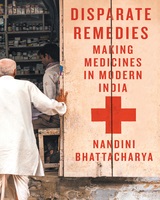Disparate Remedies
Making Medicines in Modern India
Author(s)
Bhattacharya, Nandini
Collection
WellcomeLanguage
EnglishAbstract
At present India is a leading producer, distributor, and consumer of generic medicines globally. Disparate Remedies traces the genealogy of this development and examines the public cultures of medicine in the country between 1870 and 1960. The book begins by discussing the expansion of medical consumerism in late nineteenth-century India when British-owned firms extended their sales into remote towns. As a result, laboratory-produced drugs competed with traditional remedies through side-by-side production of Western and Indian drugs by pharmaceutical companies. The emergent middle classes, the creation of a public sphere, and nationalist politics transformed the medical culture of modern India and generated conflict between Western and Indigenous medical systems and their practitioners. Nandini Bhattacharya demonstrates that these disparate therapies were sustained through the tropes of purity or adulteration, potency or lack of it, and epistemic heritage, even when their material configuration often differed little. Uniquely engaging with the cultures of both consumption and production in the country, Disparate Remedies follows the evolution of medicine in colonial India as it confronted Indian modernity and changing public attitudes surrounding health and drugs.
Keywords
Medicines; IndiaISBN
9780228017523, 9780228017530, 9780228017905, 9780228018605, 9780228017899Publisher
McGill-Queen’s University Press (mqup)Publisher website
https://www.mqup.ca/Publication date and place
Montreal, 2023Grantor
Series
Intoxicating Histories, 7Classification
Medicine and Nursing


 Download
Download